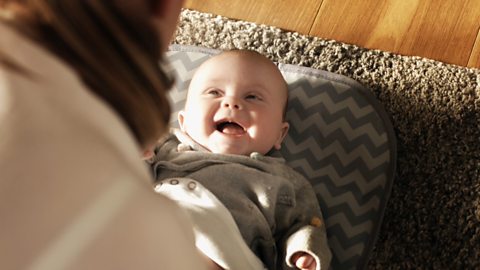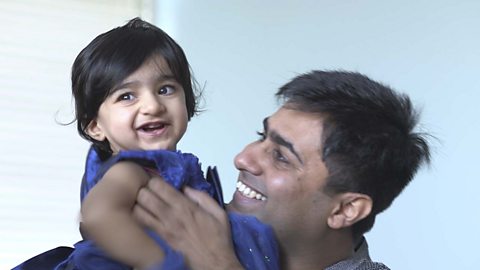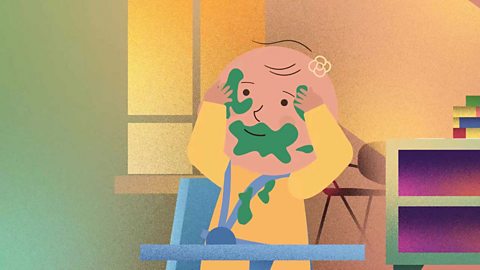Laughing together at any age is a great way to bond and boost your wellbeing.
But for babies and toddlers, itâs also a great chance to learn and an opportunity to show that theyâre starting to understand the world around them.
âHumour is linked to development but thereâs so much more to it!â says Professor Vasu Reddy, an expert in child humour from the University of Portsmouth.
We laugh and play together because itâs fun; it makes for happiness, contentment and feels good.
And while there is no one way to build a sense of humour, experts have discovered some common behaviours and stages as it emerges.
What's the earliest age that babies show humour?
Researchers at the University of Portsmouth found that from the age of seven or eight months children intentionally use their faces, bodies and voices to make adults laugh or smile.
And a University of Sheffield study found children as young as 16 months can understand the difference between pretending and joking.
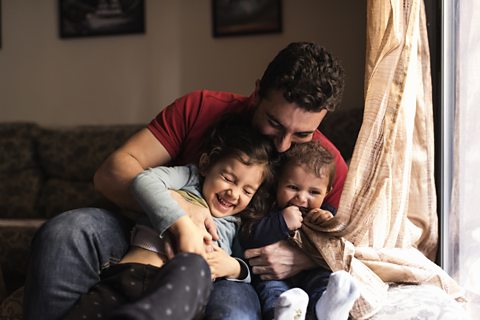
What makes babies laugh?
Most laughter in the early years is all about simple human interaction, so donât worry that you have to be a 24/7 on-call comedian to make your children laugh â just concentrate on simple things like chatting and interacting.
Their sense of humour will adapt and change as they develop imagination, language skills and the ability to see things from someone elseâs point of view.
âBut itâs important to not compare your child with others as everyone learns at their own rate,â says Professor Reddy. âHumour feeds off audience reactions, so if you want a comedian in your family â keep laughing.â
Find out more about what makes babies laugh.
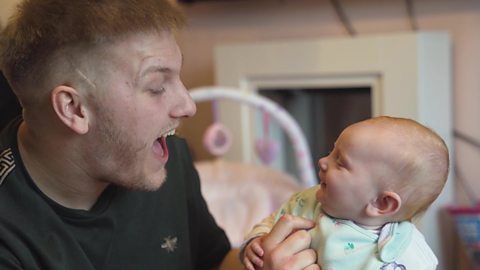
Humor development in childhood
| Age | Stage of humour |
|---|---|
| 3-4 months: First giggles | Babies start laughing as young as three-months-old. It can feel like their laughter comes at odd times, but itâs usually triggered by something they see or hear their parents do for them. |
| 7-8 months: Baby comedians | Babies get creative with their faces, bodies and voices in an effort get their parents and families laughing. You might notice them repeating the sounds and faces you laugh at. |
| 9-10 months: Cheeky monkeys | Has your baby started to play with things they know they shouldnât with a cheeky grin on their face? This is the beginning of what is known as âdisruptiveâ or âteasingâ humour. |
| End of first year: Rule breakers | Babiesâ amazing brains have developed quickly to understand some basic social rules and they start to find it funny when these rules are broken. This starts with silly faces and âwrongâ actions, for example if they see an adult pretend to drink out of their bottle. |
| End of second year: Laughing at language | As children get older, they start to show their sense of humour through breaking language ârulesâ. It might seem silly when your baby says âcats go mooâ or they call mum âdaddyâ but the fact theyâve learned to know these things are wrong and funny, shows a lot of understanding. |
| Toilet training: Potty mouth | Around the time you start toilet training, you might notice that your child becomes obsessed with poo and wee overnight. Going to the toilet (and the things that happen there) might seem normal and everyday to you but in their little worlds, itâs really important. So, if your child is finding poo and wee really funny, see as a good sign that they understand whatâs happening around them. |
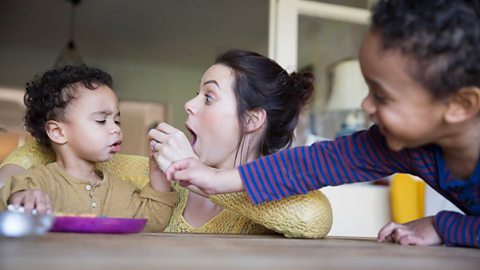
Why do babies find surprises funny?
Their sense of humour may change as they get older, but one constant is that surprises are always funny.
By showing things going wrong and teaching us how to break rules in a safe way, they guarantee laughter and help build your bond.
âBabies can be surprised even in the first few months of life,â says Professor Reddy.
But not everything surprising is funny. To be humorous, there also needs to be a âplayful frameâ.
In other words, to enjoy surprises, babies need to understand the context in which they happen and be able to share the emotional reactions of people around them.
Peekaboo is a great (and possibly universal) example of the element of playful surprise, and itâs usually a favourite of younger children who arenât talking yet.
When theyâre older, children start to play with language and this is reflected in the kinds of surprises that entertain them.
Adding an unexpected word in their favourite song or choosing unexpected music for your dance together are easy ways to introduce surprise to older children, recommends Sam Avery, a stand-up comedian and dad to twin five-year-old boys.
âI remember when the boys were really into rainbows, I decided to sing âHeads, shoulders, knees and rainbowsâ and they screamed with laughter! We tried it again with âwheels on the rainbowâ and they laughed and laughed.â
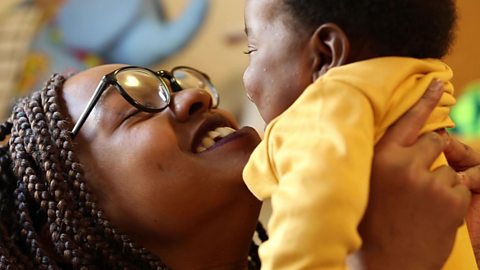
How to help your baby's sense of humour develop
Developing a sense of humour has plenty of benefits for your child; it will help them build relationships with friends and family, feel confident, and learn about their culture.
Itâs great for you too â the sound of a child laughing is magical and can do wonders for your stress levels. And there are easy ways you can help make everyday life more comical.
1. Start early
Babies are born ready to laugh â experts believe they even start practising to chuckle in the womb. See how they respond to humour in their first months â even really young babies can start to learn about it through physical games, such as peekaboo and they love tickling.
2. Let them lead
What makes your child laugh changes every day, so trust the moment. âIf you let them lead, theyâre more likely to engage,â says Professor Reddy.
3. Get involved
Pretending together helps children understand and learn language, and builds their imagination too. Calling daddy âmummyâ or âbabyâ is one easy way to role play and pretend together.
4. Lift the mood with comedy
Laughter can instantly defuse a tense situation but you can also use it indirectly. âFor example, Iâve found humour can be a great way to explore the ideas of failure and success,â says Sam. Your child might think their wonky drawings are âwrongâ but if you talk about them as âsillyâ and âfunnyâ it can help lift their mood and confidence.
5. Use laughter to learn
Laughing and playing can be a great way to support childrenâs memory. âAnything you can find to keep you and your kids laughing will win,â says Sam. Silly dance to music together or use funny sound-effects at story time â it all helps children learn.

